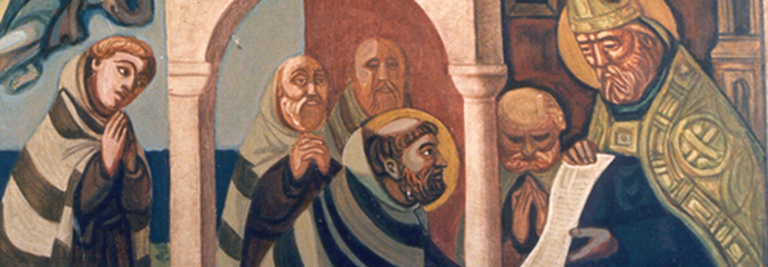At the time of the Crusades to the Holy Land, hermits settled in various places throughout Palestine. Some of these, “following the example of Elijah, a holy man and a lover of solitude, adopted a solitary life-style on Mount Carmel, near a spring called Elijah’s Fountain. In small cells, similar to the cells of a beehive, they lived as God’s bees, gathering the divine honey of spiritual consolation.”
Unlike most religious orders, the Carmelites have no founder. Instead, we trace our beginning to some hermits who settled on Mount Carmel in Palestine more than 800 years ago. Historians aren’t sure what led these men to give up everything they had to live in bare cells, but we can surmise that they faced personal disappointments or tragedies that led to a desire for a radical change of life. Some may have been unhappy with the violence and excess they saw around them. Others may simply have felt a call to be closer to God.
Moved by “their love of the Holy Land”, these hermits consecrated themselves in this Land to the One who had paid for it by the shedding of his blood, in order that they might serve him, clothed in the habit of religious poverty,” persevering “in holy penance” and forming a fraternal community.
While we call these early Carmelites hermits, they actually lived with others in shared solitude. These first brothers took responsibility for one another. When sometime after 1206 they asked the Patriarch of Jerusalem, Albert, to draw up their way of life in a Rule, the relationships among themselves and with their leader were critical. This Rule of Life, which Albert presented to them in 1214, directs the hermits celebrate Eucharist together each day in a place near their cells and to gather weekly encourage and correct each another. This Rule is a formula for living that Carmelites still follow today.
Soon after they received the Rule, Jerusalem fell from Latin hands and the hermits were forced from their mountain. They began to migrate to the West with those leaving the Holy Land. They settled in Sicily, Italy, Spain, France, and England.
This journey not only led them to a new home, but also to a very different style of life.
Biography
Saint Albert was born towards the middle of the 12th century in Castel Gualtieri in Emilia, Italy. He entered the Canons Regular of the Holy Cross at Mortara, Pavia, and became Prior there in 1180. In 1184, he was named bishop of Bobbio, and the following year he was transferred to Vercelli which he governed for twenty years. During this period, he undertook diplomatic missions of national and international importance with rare prudence and firmness: in 1194, he effected a peace between Pavia and Milan and, five years later, also between Parma and Piacenza. In 1191, he celebrated a diocesan synod which proved of great value for its disciplinary provisions which continued to serve as a model until modern times. He was also involved in a large amount of legislative work for various religious orders: he wrote the statutes for the canons of Biella and was among the advisers who drew up the Rule of the Humiliates.
In 1205, Albert was appointed Patriarch of Jerusalem and a little later nominated Papal Legate for the ecclesiastical province of Jerusalem. He arrived in Palestine early in 1206 and lived in Acre because, at that time, Jerusalem was occupied by the Saracens. In Palestine, Albert was involved in various peace initiatives, not only among Christians but also between the Christians and non-Christians and he carried out his duties with great energy. During his stay in Acre he gathered together the hermits on Mount Carmel and gave them a Rule. On 14th September 1214, during a procession, he was stabbed to death by the Master of the Hospital of the Holy Spirit, whom Albert had reprimanded and deposed for his evil life.
Prayer
Albert, you shine before us
Legislator, Shepherd true,
Hear in love the hymns of homage
Which your children sing to you.
Messenger of peace and concord,
Careful to foresee all need,
You instructed all your faithful
Zealously by word and deed.
From your virtues this whole country
Shines with many a precious gem;
Most of all your mem’ry’s fragrance
Clings about Jerusalem.
So renowned that Church, so honoured
When you worked as pastor there,
Carmel’s hermits asked for precepts
To define a life of prayer.
We are grateful to you, Father,
For the Rule which we profess,
Apt to guide each one in Carmel
To the heights of holiness.
With your Rule to give us increase
Fruit abundant may we see,
When with you we praise in heaven
God eternal, One in Three.
Margarita of Jesus, OCD



